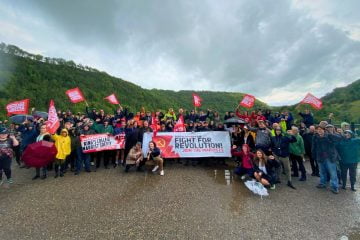On 30 October the IWGB will be facing Uber at the Court of Appeal as part of the ongoing battle over workers’ rights. A victory would put us one step closer to ending the attack on our rights that so-called “gig economy” bosses are conducting with near impunity.
This is not just about Uber drivers, but about all of us that are being forced into increasingly more precarious forms of work. That’s why all precarious workers, from Deliveroo couriers to outsourced workers, will be marching together demanding an end to precarious work and a revival of the basic employment rights that we are being denied.
The march will start at 8:00 at Transport for London (197 Blackfriars Road), go past the Royal Courts of Justice and end at the University of London, where workers are fighting to end outsourcing. FULL DETAILS HERE.
Marxist students from across London and further afield will be mobilising for this demonstration. The motion below has been passed by the KCL Marxist society, and is being presented to Marxist societies elsewhere this week. We encourage everyone to attend the demonstration next week to stand up for the rights of precarious workers.
—–
Precarious employment has become a typical feature of our lives under capitalism. More and more, workers are being forced to accept low pay, poor working conditions and minimal rights as standard. Over 10 million people in Britain are currently considered to be in precarious work. This includes zero hours contracts, temporary employment, underemployment or the hollow ‘self-employment’ of companies like Uber and Deliveroo. This represents an absurd number of people in our society who are barely able to live off their wages and are living in a desperate social and financial situation.
- To send a delegation to join the IWGB’s demonstration on October 30th, in solidarity with those in precarious employment.
- To continue the fight at our own university to oppose precarious employment and ensure that all our staff have the working rights they deserve.
- To struggle more widely against the capitalist system that engenders this exploitation and fight to bring down the Tory government that represents its interests.




0 Comments